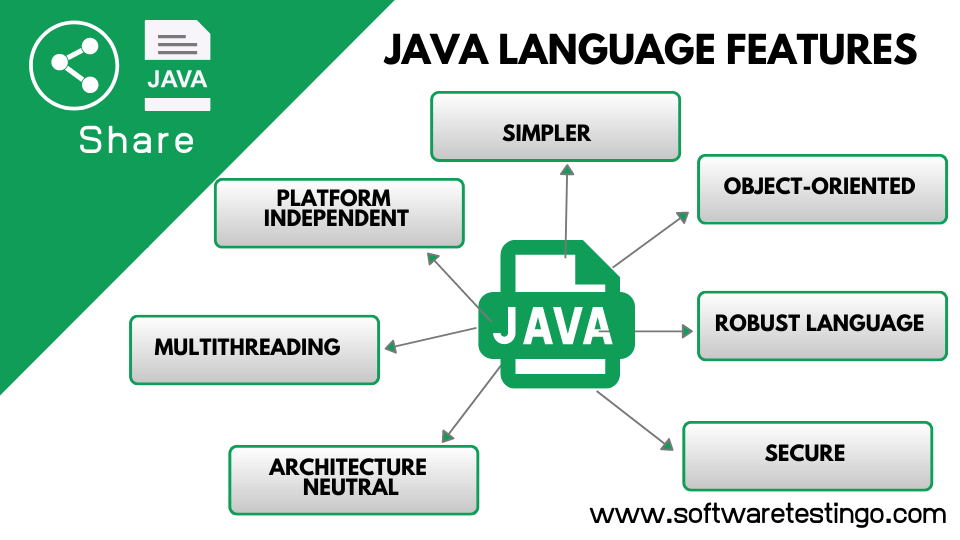Java Programming language: Java is widely used to develop various applications. One of the reasons for its popularity is the unique features that it offers. Java is an object-oriented language, meaning it is based on the concept of objects that interact with each other to create software applications.
In addition, Java is platform-independent, which means that it can run on any hardware or operating system. Other features of Java include its simplicity, portability, security, and multi-threading capabilities. These features make Java ideal for developing complex applications such as enterprise-level software, web applications, and mobile applications.
As we move forward, we will try to explain the important features of Java programming language in detail. So, don’t skip the next paragraph of this blog post.
Java Programming Languages Features
Let’s discuss some of the Java Programming features :
- Simpler: Java programming language is easy to learn because it does not include concepts like pointers and operator overloading, available in C++.
- Object-Oriented: It is one of the main features of Java, which makes Java one of the most popular languages. Because of this feature, you can model the program into an object which can have data and behavior. Java has four object-oriented concepts: Abstraction, Encapsulation, Polymorphism, and inheritance.
- Robust Language: Java language was developed in such a way that it can do early checking for possible errors. We can say that when the compiler compiles the Java code, the Java compiler can detect Java errors, but when you compare this feature with another programming language, you may not find such rich features. Other features make Java robust, like garbage collection, Exception Handling, and memory allocation.
- Secure: In Java, You May not find concepts like a pointer, and you can not access the out-of-boundary array element, which makes Java more secure.
- Architecture Neutral: Java is Architecture neutral because Java does not have such types of features dependent on the environment’s architecture. For example, the size of the primitive data type in Java, which is 4 bytes, has been fixed. In contrast, the c programming languages int data type takes 2 bytes of memory for 32-bit architecture and 4 bytes for the 64-bit architecture.
- Multithreading: Because of the multithreading feature of Java, you can run parallel execution of two or more parts of the program, which allows you to maximize CPU utilization.
- Platform Independent: As we already shared, after compilation, you get the bytecode, which is platform independent, so that you can execute the same code in a different system and different environment. Because of this feature, Java is platform-independent or portable.

Along with all the above Java Programming features, java programmers also get benefits from the Good Java community members and other benefits like:
- Oracle powers Java: As you know, Java was acquired by one of the best leaders in the Industry, Oracle. So, you get more support from big companies like IBM, Google, and Redhat.
- You will get lots of open-source libraries that help to build your application or help you with your project.
- Many tools and IDE are available to write, compile, and run your project. With those tools, you can be more productive.
- Many frameworks help you build highly reliable applications quickly.
- The community around Java technology is massive and mature, so that you can get support quickly.
After discussing all the above points, there Is one more key feature of Java: upgrading with new features as per the current uses. So, we will see some of the important features of Java 8.
What are the Java features?
Java programming language has somany features. Some of the important features of Java are that it is a simple, familiar, object-oriented programming language that is robust, secure, high-performance, multithreaded, and platform-independent.
Which feature makes Java so useful for Internet programming?
Java is distributed because it facilitates users to create distributed applications in Java. RMI and EJB are used to create distributed applications. This feature of Java allows us to access files by calling the methods from any machine on the internet.
What is the most important feature of Java?
Important features of Java: Java is an object-oriented programming language that allows the creation of modular programs and reusable codes. Simple, object-oriented, distributed, secure, architecture, robust, multi-threaded, and dynamic language.
What is the main use of Java?
Java is a widely used programming language expressly designed for use in the distributed environment of the internet.
Why is Java the most popular programming language?
The main reason is that it is safe, portable, maintainable, and has better high-level concurrency tools than C++ or any other language.
Why is Java a robust programming language?
Java is Robust because it is a highly supported language. It is portable across many Operating systems. Java also has features for automatic memory management and garbage collection. A strong type-checking mechanism of Java also helps in making Java Robust.
How does Java enable high performance?
Java enabled High performance by introducing JIT- Just In Time compiler; JIT helps the compiler to compile the code On-demand basis, i.e., whichever method is called, only that method block will get compiled, making compilation fast and time-efficient. This makes Java deliver high performance.
